
What are the Key Competencies Needed by Business Support Organizations to Assist Rural Companies in the E-Bio Sector?
08 November 2024
An international expert group of eRural resilience project jointly developed and validated a competency profile to strengthen local business support organizations in the Baltic Sea region, enhancing their ability to assist companies interested in implementing e-bio business solutions.
Local authorities, business support centers, SMEs, and NGOs actively promote rural business development but face inherent rural challenges, such as limited local markets, high utility and transport costs, and skill shortages. The integration of digital and green transitions offers promising solutions, allowing rural communities to use renewable biological resources to create high-value bio-products (e.g., food, feed, or bio-based products). For success, rural businesses need robust e-business capabilities and bio-products that appeal globally.
However, local actors face several obstacles: they often lack technical expertise to help rural businesses convert natural resources into high-value products and require enhanced skills to guide SMEs on emerging bio-product selling platforms, effective channels, logistics, and packaging.
To equip rural authorities and business centers with comprehensive tools to foster e-bio-businesses in rural areas, eRural resilience project consortium developed a Competency Profile and describe the required skills and competencies that the institutions have to gather in order to support the businesses in their transition to bio-businesses and e-businesses.
The eRural resilience Competency Profile aims to capture and describe these e-bio-business supporters’ specific 15 sub-competencies organised in 4 main competences:
1: Business and Management is directed at the broader professional environment, implementing strategic plans for e-bio-business supporters, encompassing goal setting, market analysis, and formulation of strategies.
2: Digital know-how looks at the competencies needed to be effectively updated on the latest digital technologies and elevate the digital proficiency of the workforce.
3: Biological Production and Sustainability is dedicated to the integration of sustainability and biological principles into the e-bio-businesses’ operations, supply chains, and marketing strategies to enhance their environmental and social responsibility.
4: Networking addresses the importance of networking competencies to effectively assist clients.
Competence profile is advised to be used for self-assessment of the organizations to identify the fields of competencies that should be improved.
The use of the competence profile for self-assessment can help organizations pinpoint areas where their skills and capabilities need enhancement. This can lead to targeted training and development, improved effectiveness in supporting e-bio-businesses, and a more strategic approach to addressing skill gaps. Ultimately, this process can strengthen the organization’s overall ability to drive sustainable business growth in rural areas.
The eRural resilience Competency Profile was finalised and approved by project consortium in May, 2024.
Interactive map showing pilot locations. Use the arrow keys to move the map view and the zoom controls to zoom in or out. Press the Tab key to navigate between markers. Press Enter or click a marker to view pilot project details.






